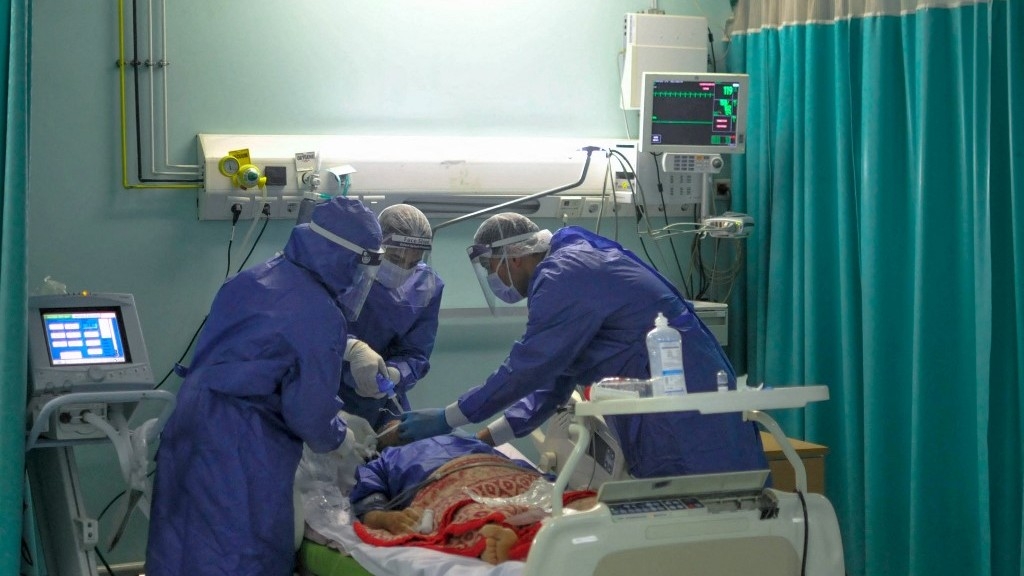Egypt: Why physicians are quitting, leaving hospitals high and dry

Egyptian doctors are resigning en masse from the nation's government-run health system, highlighting the growing discontent with chronically low salaries and underfunded hospitals.
In 2022 alone, 4,261 physicians quit their jobs in the state-run hospitals in Egypt, according to a report published this month by the Medical Syndicate, an independent union of the nation's medical doctors.
These figures were the highest in the past seven years, in which a total of 21,068 physicians quit the government sector, the syndicate said.
According to the Central Agency for Public Mobilisation and Statics (CAPMAS), there were a total of 91,500 doctors working in Egypt in 2020.
'My salary is enough to buy me a pair of trousers, socks and a shirt'
- Egyptian cardiologist
The walk-outs are creating acute shortages in the nation's state hospitals and accounting for a very low people-to-physicians ratio.
New MEE newsletter: Jerusalem Dispatch
Sign up to get the latest insights and analysis on Israel-Palestine, alongside Turkey Unpacked and other MEE newsletters
In 2019, there were 0.7 physicians per 1,000 people in Egypt, according to the World Bank.
In regional terms, this low ratio can be set against the ratio in neighbouring Libya, for example, where there were 2.1 physicians per 1000 people in 2017, or Algeria where there were 1.7 physicians per 1000 people in 2018.
The government of President Abdel Fattah el-Sisi, in office since 2014, has been criticised for failing to prioritise healthcare in its annual budget, favouring instead spending on mega construction projects and repaying debts.
Although healthcare expenditure in the budget has increased in recent years, the government has consistently fallen short of the constitutionally mandated minimum expenditure on health: three percent of gross national income.
Intolerable conditions
The actual number of doctors resigning last year may be even larger than estimated, according to Dr Ahmed Hussein, the head of the media committee in the syndicate.
He said that around 2,000 medical college graduates refused to be interned in the state-run health sector in 2022.
Graduates from the nation's 27 medical colleges have to take an internship at a state-run hospital or clinic for two years before they are given a licence to practice a medical specialty.
Nevertheless, the internship and the subsequent years are becoming nightmarish for some of the physicians, accounting for the mass resignations.
Omayma Khalil, a medical intern at the Assiut University Hospital in southern Egypt, is considering quitting.
Since graduating and joining the staff of the hospital, she saw the situation going from bad to worse.
"My colleagues and I are often humiliated and attacked physically by patients and their relatives," Khalil told Middle East Eye.
Physical attacks against healthcare workers are recurrent in Egypt, prompting the Medical Syndicate to demand protection for its members from the authorities and toughen penalties for aggressors.
These attacks compound the low salary Khalil gets. As a medical intern, she is paid 2,100 Egyptian pounds (roughly $70) every month.
With that little money, she said, she cannot afford her needs, including study, training and research.
"The study and practice of medicine are costly," Khalil said.
This is why she may join those who had already walked out of service at the state-run hospitals and seek employment, either in the private sector or outside Egypt where physicians are paid more and have better training opportunities.
The crisis is not only affecting interns or junior physicians, but also senior ones who have to divide their time between the requirements of their employment at state-run hospitals and their private clinics.
A senior cardiologist, who refused to be named, mocked the salary he gets after 20 years of work at a state-run hospital.
"The salary is enough to buy me a pair of trousers, socks and a shirt," he told MEE.
He has to do more than one job to be able to feed his family and pay the bills.
Overworked
Another medical intern said he gets a salary of 1,970 pounds ($65) from the state-run hospital where he works.
Another told a popular talk show on a local television channel last month that he and his colleagues sometimes have to work 96 hours a week.
"The lack of sleep causes physicians to make mistakes," he said.
'How can one lead a dignified life with a salary that low'
- Aya Hussein, medical intern
He said the hospital administrations penalise the physicians for making mistakes by forcing them to work more.
The same physician said almost all departments in his hospital are understaffed.
This is why, he said, one or two physicians can be working in departments where six or seven physicians should be working.
Aya Hussein, another medical intern from Assiut University Hospital, said with the salary she gets, she cannot lead a dignified life or meet any of her needs.
"How can one lead a dignified life with a salary that low?" Hussein asked.
She told MEE that, apart from the low salary, she has no training opportunities, with most senior physicians not having time to train medical interns like her.
These tough conditions make resignations among the nation's physicians a normal outcome, officials at the Medical Syndicate say.
"How can any physician work in these conditions?" Ibrahim al-Zayat, a member of the board of the Medical Syndicate, asked.
He told MEE that repeated resignations among the physicians have stoked shortages in the state-run hospitals.
"The sorry thing is that these resignations cannot be stopped," Zayat said. "Some physicians cannot put food on the table for their children."
Plea for action
The state-run hospitals are the backbone of the health sector in Egypt, offering treatment and services to hundreds of thousands of people every day, almost for free.
In 2020, there were 662 state-owned and run hospitals in Egypt, from 652 hospitals in 2019, according to CAPMAS, the statistics arm of the Egyptian government.
The agency said 57 million Egyptians had national health insurance in the same year, which amounts to almost half of Egypt's population.
Despite the deteriorating conditions of these hospitals, they remain a last refuge for the low-income population. An estimated 60 million people live below or just above the poverty line ($3.20 per day) in Egypt.
The underfunded system has been dealt another blow from the dual impacts of the Russia-Ukraine war and the Covid-19 pandemic on the import-dependent economy.
Meanwhile, the sharp loss of value of the Egyptian pound to the US dollar since 2016 also meant that the cost of medical treatment is rising.
Patients need to have a fortune if they seek treatment at any of the nation's privately owned health institutions, with the prices of medicines rising dramatically and hospitals hiking the prices of their services.
"The state-run hospitals are the only option for tens of millions of people who cannot afford to pay for their treatment," Ahmed Abdel Maged, a member of the Committee on Health in the Egyptian Senate, told MEE. "They are a cornerstone of Egypt's social security."
He expressed fears that the state-run hospitals may find themselves incapable of offering services to the poor with these successive physician resignations.
The doctors quitting the state-run hospitals end up either working for one of the nation's private health institutions that entice state-employed physicians with money and other perks, or leaving Egypt altogether for rich Gulf nations or Europe.
Of all 212,853 physicians registered in the Medical Syndicate, more than half - 120,000 - have already left Egypt for other countries in the past few years.
'The government is badly in need of paying the physicians well, or it will not manage to stop the resignations' tide'
- Ibrahim al-Zayat, Medical Syndicate
Some MPs are also alarmed at this migration, calling on the authorities to take action.
MP Ahmed Abdel-Salam Qoura called on the government to take some action to dissuade physicians from walking out of the government-managed healthcare sector.
The Medical Syndicate also requested a meeting with Ministry of Health officials to discuss the issue.
Commenting on the physicians' resignations in December, Minister of Health Khaled Abdel-Ghaffar said his ministry works hard to improve the financial conditions of the physicians and convince them not to leave.
In August, President Abdel Fattah el-Sisi instructed the government to increase the salaries of the physicians working for the state-run hospitals.
However, this has done nothing to satisfy the physicians financially, Medical Syndicate officials said.
"The increase was far from enough, especially because of rising commodity prices," Zayat said. "The government is badly in need of paying the physicians well, or it will not manage to stop the resignations' tide."
Middle East Eye delivers independent and unrivalled coverage and analysis of the Middle East, North Africa and beyond. To learn more about republishing this content and the associated fees, please fill out this form. More about MEE can be found here.






